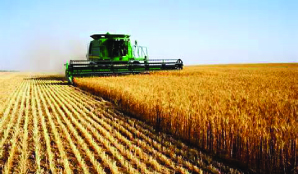
• Government has urged farmers to embrace cooperatives as well as new farming
technologies to cushion the impact of climate change.
By TIMOTHY MUZIA –
Mkushi District, renowned for being amongst the leading agricultural regions in the country, has not relinquished this reputation in recent years as it continues to churn out impressive crop production statistics.
According to data obtained from the Mkushi District Agriculture Coordination Officer (DACO) Chiluba Wabalika, the average maize output over the past three farming seasons has been about 130,000 tonnes, with small-scale farmer cooperatives contributing significantly to these statistics.
Small scale farmer cooperative contributions has also been meaningful with regards to other crops such as soya beans, with the average yield over the past three years hovering between 24,000 and 30,000 tonnes.
These statistics alone seem to back the widespread assumption that Mkushi is a rich district, with further presumption that farmers of all scale are well consolidated in business ventures.
Recent observations made during the 2015 International Cooperatives Day commemorations, however, exposed the huge wealth inequality that exists between the commercial and small scale farmers.
When Mkushi District Council Deputy Chairperson Lewis Mayuya officiated at the 2015 Cooperative Day under the theme ’Choose Cooperatives, choose Equality’, he disclosed that the average crop yield for one commercial farmer equaled that of about 200 small-scale farmers.
Mr Mayuya pointed out the need for the cooperative movements to move away from being groupings that convene or become active for the sole purpose of obtaining fertiliser and seed from Government initiated Farmer Input Support Programme (FISP).
During similar commemorations held in the previous year, Mkushi District Commissioner (DC) Luke Mwamba urged cooperatives to mould themselves into sustainable income generating ventures with business activities that operate throughout the financial year.
Mr Mwamba further called on cooperatives to evolve into viable business groupings in explaining that Government was eager to see Cooperatives grow to firmly constitute 60 per cent of the private sector commercial entities.
Mr Wabalika observes that less than 25 per cent of the 700 registered Cooperatives in the District have business ventures that are active throughout the year, saying that his office has been relentlessly trying to impart enterprise skills in a bid to encourage the notion of the cooperative as a self sustaining solid income generating entity.
The sentiments from these three officials seem to suggest that the perceived wealth of the district is mirrored by the ‘financial muscle’ of the commercial farmers that number about 250 in the Mkushi farming bloc, as the majority of the cooperatives are totally dependent on FISP.
Government’s quest to propel the nation into attaining middle income status by 2030 is clearly stated in the Sixth National Development Plan (SNDP), and such a vision requires hurdles such as poverty reduction, unemployment, Small-Medium Enterprises (SMEs) stagnation, to be cleared.
In any district, cooperatives arguably have the highest membership population amongst all the organised business groupings, a situation that makes them suitable targets for policy implementation that aim to haul a great number of the populace out of poverty.
British born writer John Hanson (formerly Senior Lecturer at Huddersfield College) writes that farmer cooperatives are technically business organisations that are owned and managed by the farmers themselves who divide the profit amongst themselves.
In his seventh Economics Edition, Hanson further points out the rise in prominence of Cooperatives in mid to late 20th Century in western Europe, acknowledging the fact that Governments initially helped to provide some measure of financial assistance together with the farmers themselves during the primary stages of the cooperative movement.
In this regard, the Zambian Government has scored well as it has consistently helped to fortify the cooperatives with subsdised fertiliser and seed inputs (FISP), as well as provided the market outlet, namely for maize crop, through the Food Reserve Agency (FRA), annually, apart from imparting entreperenurial skills through DACO extension services.
To nudge the Cooperatives into evolving into the general partnership type of business entities, may have to bring on board concerted facilitation from institutions that oversee private sector development such as the Zambia Development Agency(ZDA), to coordinate efforts such as the following:
(1) Facilitate intensive orientation of cooperatives in the corporate sector , namely the structural organisations and operations of general partnerships, public and private limited firms.
(2) To work towards redesigning the affiliation of cooperatives from being exclusively overseen and regulated by the Ministry of Agriculture and Livestock, to dual affiliation that includes the Ministry of Commerce and Industry, via mandatory membership of the District Business Association (DBA).
(3) Perhaps a policy that entails that Cooperatives who benefit from FISP for a given number of time, would be weaned off from this exercise, could add impetus in stimulating the cooperatives to become well consolidated, self reliant entities that operate beyond reliance on FISP.
(4) Deliberate policy of Tax rebate for cooperatives that venture into food secondary production such as food processing industry or any other diversified investment, Tax exemption that applies for a specified period.
(5) Cooperatives to cement working relations with insurance companies so that these companies insure the Cooperative members against losses resulting from various factors.
In reflecting on the 2015 International Cooperative Day Theme ‘Choose Cooperatives, choose equality’, the cooperatives themselves can not be far removed from the onus of efforts involved in steering the country into middle income status by 2030 as their membership encompasses rural and urban populace, easily making them the largest business grouping in the country.






